Shipping country and language
Your country of residence may be:
Your country of residence is:
For a better user experience on our website, you can select:
Your shipping country:
-
Andorra
-
Austria
-
Belgium
-
Bulgaria
-
Canada
-
Chile
-
Croatia
-
Cyprus
-
Czechia
-
Denmark
-
Estonia
-
Finland
-
France
-
Germany
-
Greece
-
Hungary
-
Iceland
-
Ireland
-
Italy
-
Latvia
-
Lithuania
-
Luxembourg
-
Malta
-
Monaco
-
Netherlands
-
Poland
-
Portugal
-
Romania
-
Slovakia
-
Slovenia
-
Spain
-
Sweden
-
Switzerland
-
United Kingdom
We only deliver seed and bulb products to your country. If you add other products to your basket, they cannot be shipped.
Language:
-
French
-
German
-
Spanish
-
English
-
Italian
My Account
Hello
My wish lists
Log in / Register
Existing customer?
New customer?
Create an account to track your orders, access our customer service and, if you wish, make the most of our upcoming offers.
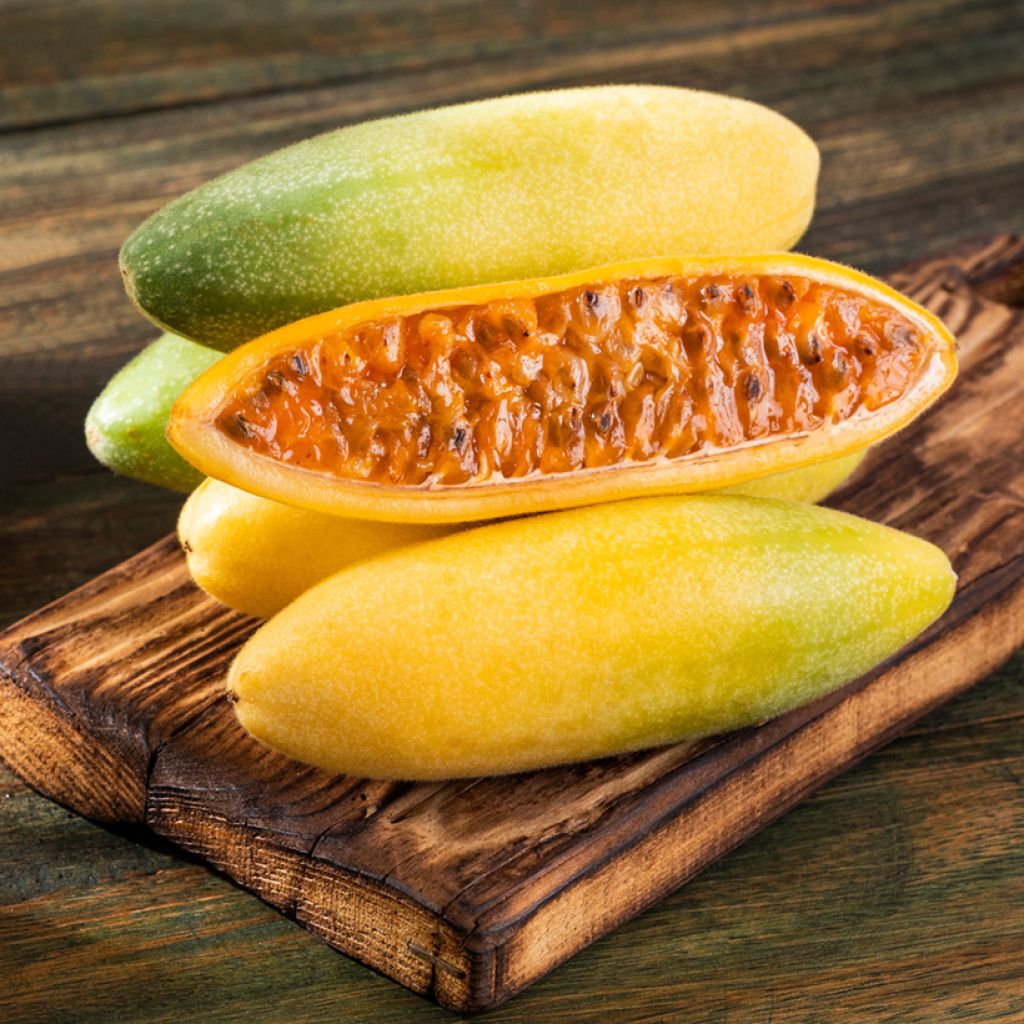

Passiflora tripartita var. mollissima seeds - Curuba
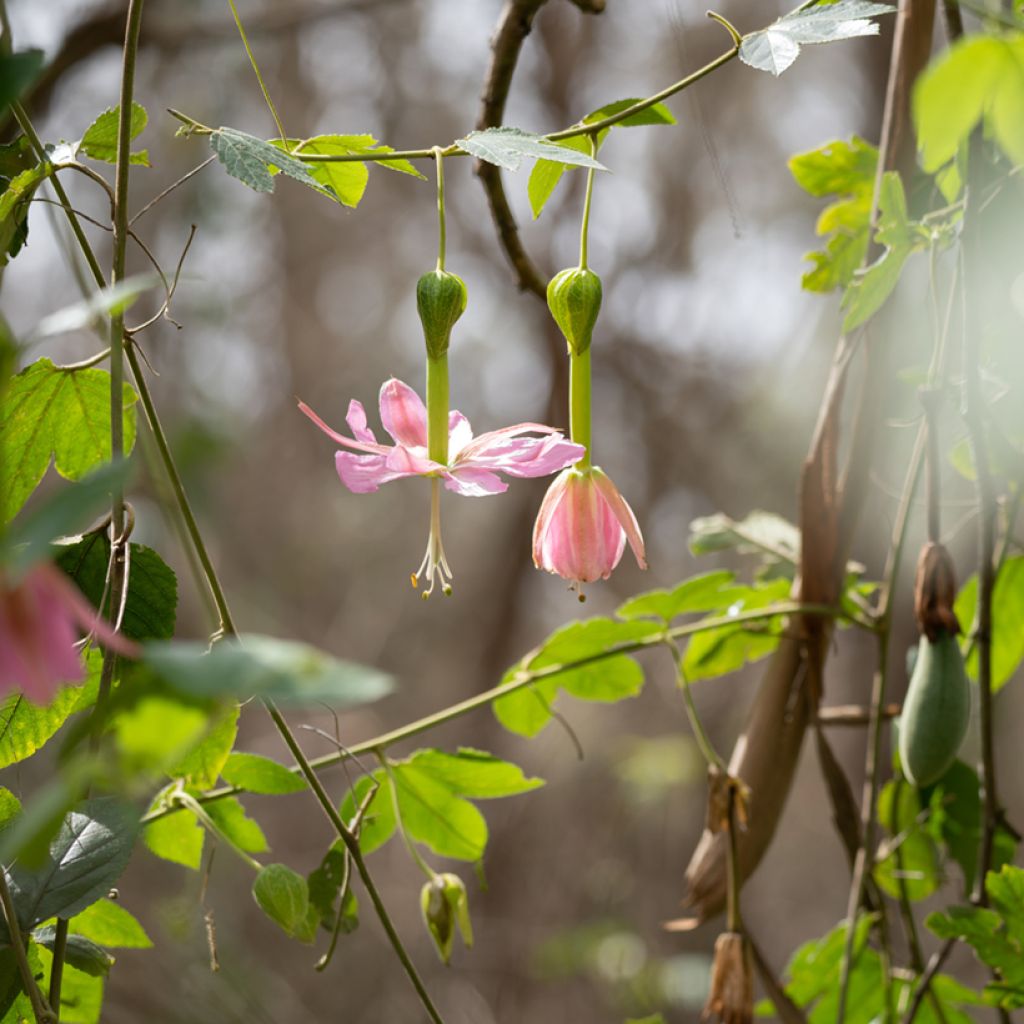

Passiflora tripartita var. mollissima seeds - Curuba
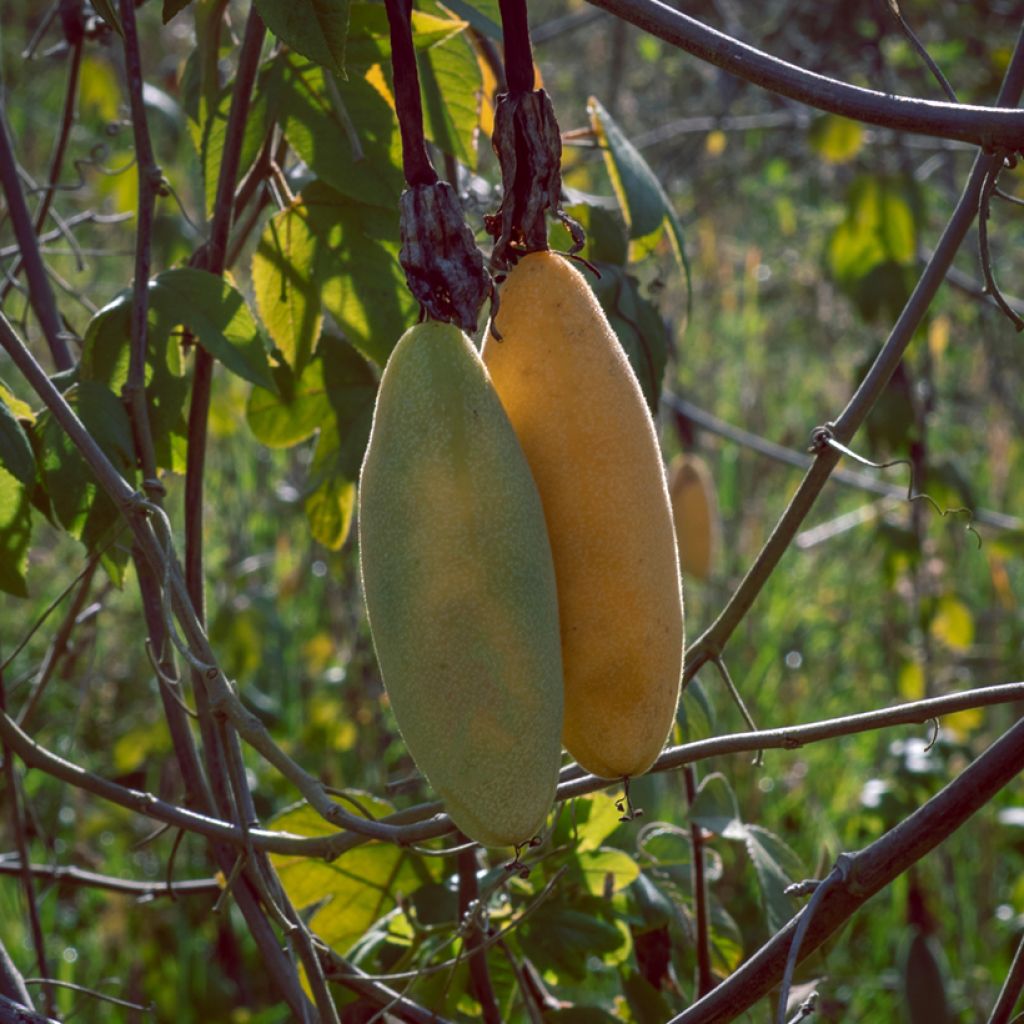

Passiflora tripartita var. mollissima seeds - Curuba
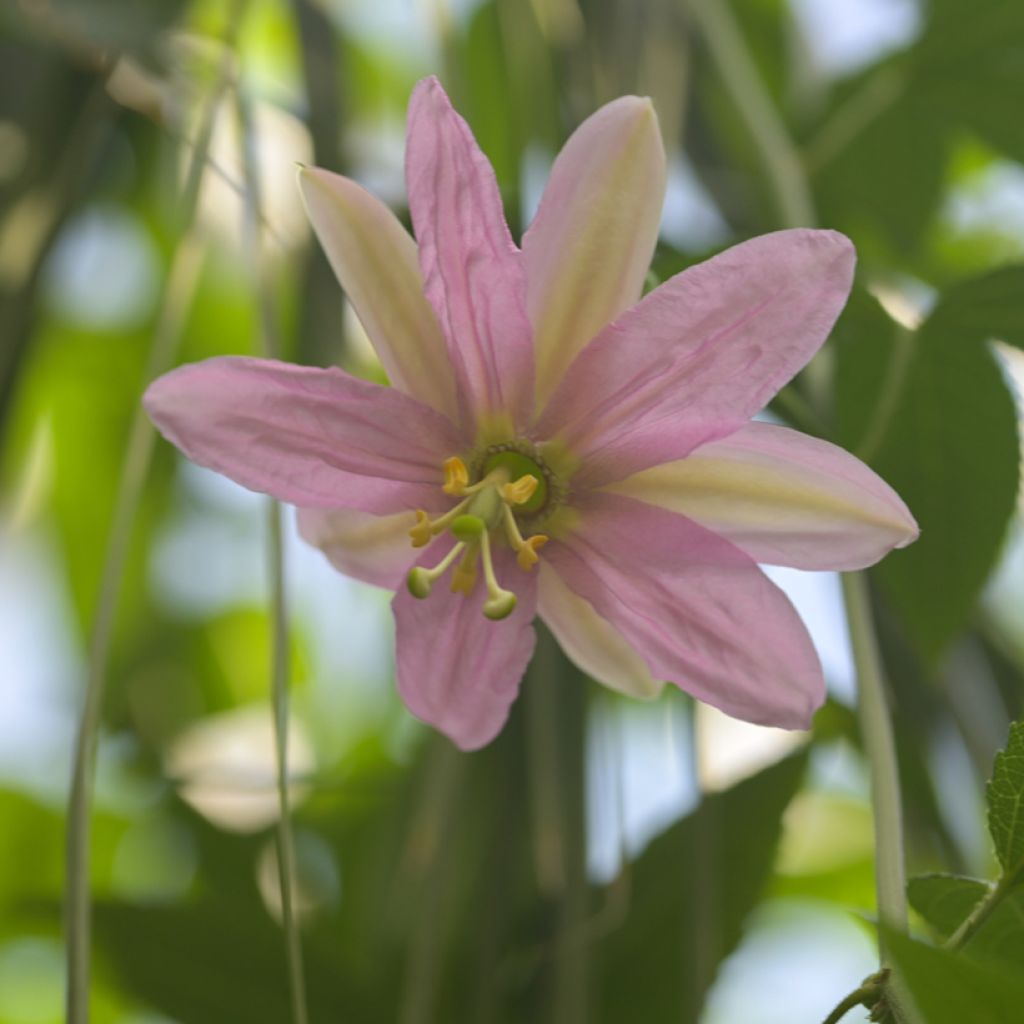

Passiflora tripartita var. mollissima seeds - Curuba
Passiflora tripartita var. mollissima seeds - Curuba
Passiflora tripartita var. mollissima
Banana Passionfruit, Banana Poka, Softleaf Passionflower
Order in the next for dispatch today!
Dispatch by letter from 3,90 €.
Delivery charge from 5,90 € Oversize package delivery charge from 6,90 €.
More information
This item is not available in your country.
Shipping country:
-
Andorra
-
Austria
-
Belgium
-
Bulgaria
-
Canada
-
Chile
-
Croatia
-
Cyprus
-
Czechia
-
Denmark
-
Estonia
-
Finland
-
France
-
Germany
-
Greece
-
Hungary
-
Iceland
-
Ireland
-
Italy
-
Latvia
-
Lithuania
-
Luxembourg
-
Malta
-
Monaco
-
Netherlands
-
Poland
-
Portugal
-
Romania
-
Slovakia
-
Slovenia
-
Spain
-
Sweden
-
Switzerland
-
United Kingdom
Schedule delivery date,
and select date in basket
This plant carries a 6 months recovery warranty
More information
We guarantee the quality of our plants for a full growing cycle, and will replace at our expense any plant that fails to recover under normal climatic and planting conditions.
Seed-only orders are dispatched by sealed envelope. The delivery charge for seed-only orders is 3,90 €.
Would this plant suit my garden?
Set up your Plantfit profile →
Description
The Passiflora tripartita var. mollissima, also known as Curuba or Banana Passionflower, is a Passion Flower originating from the mountainous regions of South America. This exotic climbing plant is characterised by its light pink flowers and edible elongated fruits, which turn yellow-orange when ripe. It is a beautiful tropical plant that can be grown in a pot in our climates. Ornamental and interesting for its tasty fruits, this passionflower will delight enthusiasts of original conservatory plants.
Passiflora tripartita var. mollissima belongs, like all passionflowers, to the Passifloraceae family. It is a botanical species native to the mountainous regions of the Andes, especially Ecuador and Colombia. In the wild, it grows in cool areas at an altitude between 1,800 and 3,000 metres. This vigorous climbing plant can reach up to 7 m in length in its natural habitat. Grown in a pot, its growth will be much more modest. Its foliage consists of large trilobed dark green leaves, measuring about 10 to 15 cm long. They are slightly fuzzy, especially on the underside. The leaf edges are finely toothed, and their texture is soft, hence the name mollissima, meaning "very tender" in Latin. This dense, bright green foliage contributes to the lush appearance of this climbing plant. Flowering occurs from spring to autumn. The 8 to 10 cm diameter flowers are bell-shaped and delicate pink. They are pendulous with a tubular base, featuring rather thin petals and sepals. In the centre of the corolla, there is a crown of mauve filaments with pink protuberances. The fruits are elongated, changing from green to yellow-orange when ripe and measure up to 12 cm long. They are edible, sweet, fragrant, and slightly acidic.
This Passion Flower thrives in rich, moist, well-drained soil in a sunny location. Prune after flowering to reduce the branches to maintain a beautiful shape. Use it to adorn a trellis in the conservatory or a temperate greenhouse. The growth of this passionflower is rapid, but it is very sensitive to cold: the plant suffers below 3°C. And it dislikes heatwaves.
Report an error about the product description
Passiflora tripartita var. mollissima seeds - Curuba in pictures
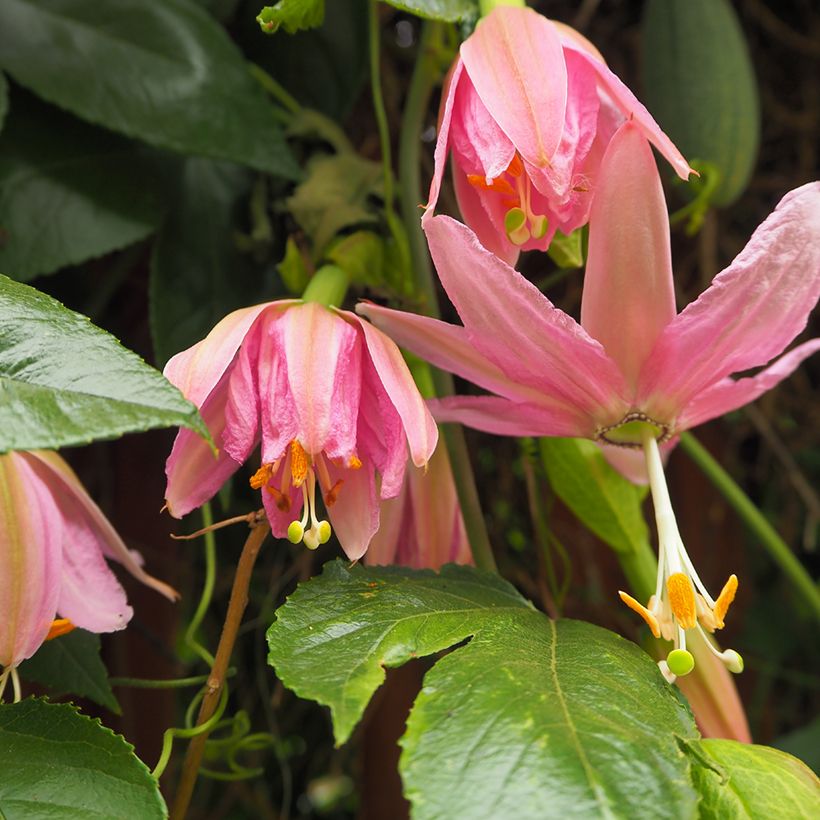

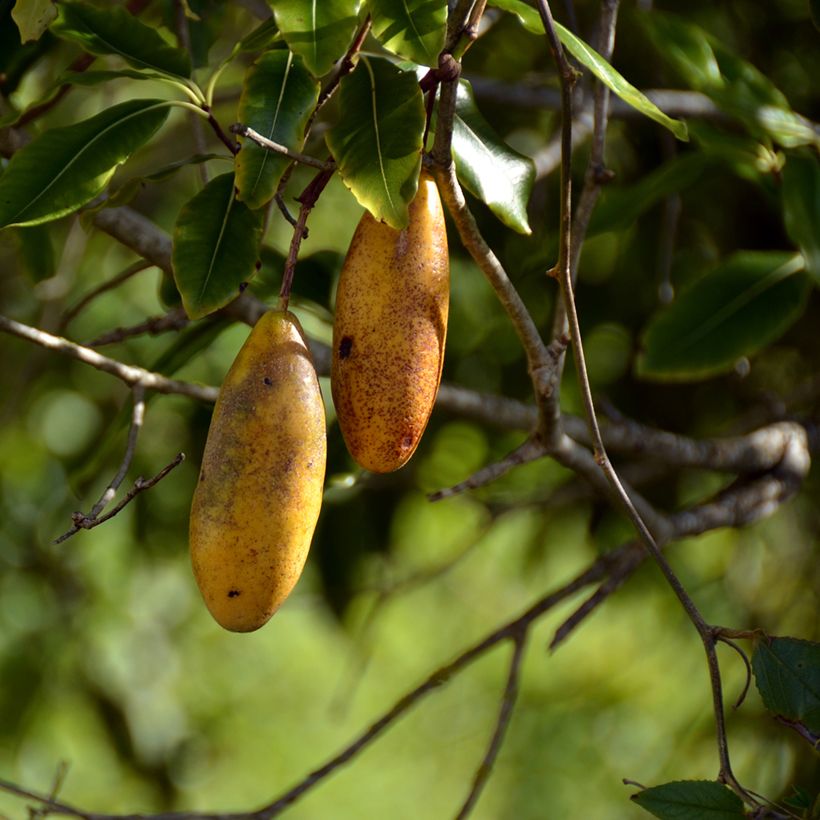

Flowering
Foliage
Plant habit
Botanical data
Passiflora
tripartita var. mollissima
Passifloraceae
Banana Passionfruit, Banana Poka, Softleaf Passionflower
Tacsonia mollissima, Passiflora mollissima
South America
Planting and care
To sow Passiflora tripartita var. mollissima, start by soaking the seeds in warm water for 24 hours to soften their coat and promote germination. Then sow the seeds at a depth of 1 cm in a light and well-drained substrate, ideally a mix of seed compost and sand. Place the pots in a warm location (between 20 and 25°C) and maintain constant humidity without saturating the substrate. Germination can take 4 to 8 weeks. Once the seedlings are strong enough, transplant them into individual pots.
For container cultivation, choose a large container (minimum 40 cm in diameter) with drainage holes to prevent excess moisture. Use a rich and airy substrate mix, composed of climbing plant compost and well-decomposed compost. Place the pot in a sunny (not scorching) to semi-shaded location, sheltered from the wind. Water regularly, allowing the substrate to dry slightly between waterings, as passionflower does not like excess stagnant water.
In winter, bring the plant indoors if temperatures drop below 5°C. Feed monthly with a potassium-rich fertiliser to encourage flowering and fruiting. Prune in spring to promote branching and limit the plant's dimensions.
This passionflower is very sensitive to scorching summer temperatures.
Sowing period
Intended location
This item has not been reviewed yet - be the first to leave a review about it.
Haven't found what you were looking for?
Hardiness is the lowest winter temperature a plant can endure without suffering serious damage or even dying. However, hardiness is affected by location (a sheltered area, such as a patio), protection (winter cover) and soil type (hardiness is improved by well-drained soil).

Photo Sharing Terms & Conditions
In order to encourage gardeners to interact and share their experiences, Promesse de fleurs offers various media enabling content to be uploaded onto its Site - in particular via the ‘Photo sharing’ module.
The User agrees to refrain from:
- Posting any content that is illegal, prejudicial, insulting, racist, inciteful to hatred, revisionist, contrary to public decency, that infringes on privacy or on the privacy rights of third parties, in particular the publicity rights of persons and goods, intellectual property rights, or the right to privacy.
- Submitting content on behalf of a third party;
- Impersonate the identity of a third party and/or publish any personal information about a third party;
In general, the User undertakes to refrain from any unethical behaviour.
All Content (in particular text, comments, files, images, photos, videos, creative works, etc.), which may be subject to property or intellectual property rights, image or other private rights, shall remain the property of the User, subject to the limited rights granted by the terms of the licence granted by Promesse de fleurs as stated below. Users are at liberty to publish or not to publish such Content on the Site, notably via the ‘Photo Sharing’ facility, and accept that this Content shall be made public and freely accessible, notably on the Internet.
Users further acknowledge, undertake to have ,and guarantee that they hold all necessary rights and permissions to publish such material on the Site, in particular with regard to the legislation in force pertaining to any privacy, property, intellectual property, image, or contractual rights, or rights of any other nature. By publishing such Content on the Site, Users acknowledge accepting full liability as publishers of the Content within the meaning of the law, and grant Promesse de fleurs, free of charge, an inclusive, worldwide licence for the said Content for the entire duration of its publication, including all reproduction, representation, up/downloading, displaying, performing, transmission, and storage rights.
Users also grant permission for their name to be linked to the Content and accept that this link may not always be made available.
By engaging in posting material, Users consent to their Content becoming automatically accessible on the Internet, in particular on other sites and/or blogs and/or web pages of the Promesse de fleurs site, including in particular social pages and the Promesse de fleurs catalogue.
Users may secure the removal of entrusted content free of charge by issuing a simple request via our contact form.
The flowering period indicated on our website applies to countries and regions located in USDA zone 8 (France, the United Kingdom, Ireland, the Netherlands, etc.)
It will vary according to where you live:
- In zones 9 to 10 (Italy, Spain, Greece, etc.), flowering will occur about 2 to 4 weeks earlier.
- In zones 6 to 7 (Germany, Poland, Slovenia, and lower mountainous regions), flowering will be delayed by 2 to 3 weeks.
- In zone 5 (Central Europe, Scandinavia), blooming will be delayed by 3 to 5 weeks.
In temperate climates, pruning of spring-flowering shrubs (forsythia, spireas, etc.) should be done just after flowering.
Pruning of summer-flowering shrubs (Indian Lilac, Perovskia, etc.) can be done in winter or spring.
In cold regions as well as with frost-sensitive plants, avoid pruning too early when severe frosts may still occur.
The planting period indicated on our website applies to countries and regions located in USDA zone 8 (France, United Kingdom, Ireland, Netherlands).
It will vary according to where you live:
- In Mediterranean zones (Marseille, Madrid, Milan, etc.), autumn and winter are the best planting periods.
- In continental zones (Strasbourg, Munich, Vienna, etc.), delay planting by 2 to 3 weeks in spring and bring it forward by 2 to 4 weeks in autumn.
- In mountainous regions (the Alps, Pyrenees, Carpathians, etc.), it is best to plant in late spring (May-June) or late summer (August-September).
The harvesting period indicated on our website applies to countries and regions in USDA zone 8 (France, England, Ireland, the Netherlands).
In colder areas (Scandinavia, Poland, Austria...) fruit and vegetable harvests are likely to be delayed by 3-4 weeks.
In warmer areas (Italy, Spain, Greece, etc.), harvesting will probably take place earlier, depending on weather conditions.
The sowing periods indicated on our website apply to countries and regions within USDA Zone 8 (France, UK, Ireland, Netherlands).
In colder areas (Scandinavia, Poland, Austria...), delay any outdoor sowing by 3-4 weeks, or sow under glass.
In warmer climes (Italy, Spain, Greece, etc.), bring outdoor sowing forward by a few weeks.
